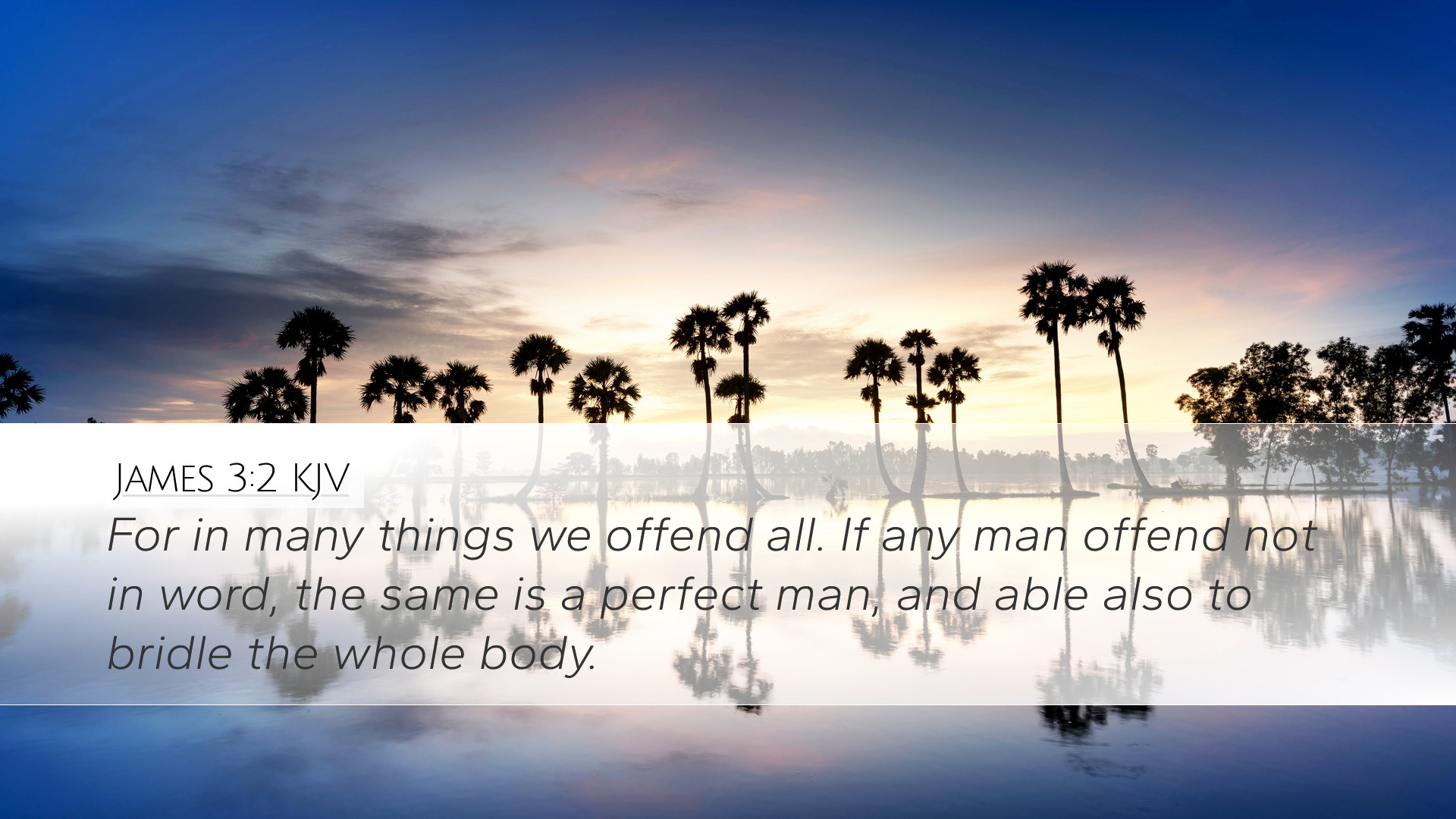Old Testament
Genesis Exodus Leviticus Numbers Deuteronomy Joshua Judges Ruth 1 Samuel 2 Samuel 1 Kings 2 Kings 1 Chronicles 2 Chronicles Ezra Nehemiah Esther Job Psalms Proverbs Ecclesiastes Song of Solomon Isaiah Jeremiah Lamentations Ezekiel Daniel Hosea Joel Amos Obadiah Jonah Micah Nahum Habakkuk Zephaniah Haggai Zechariah MalachiJames 3:2
James 3:2 KJV
For in many things we offend all. If any man offend not in word, the same is a perfect man, and able also to bridle the whole body.
James 3:2 Bible Commentary
Commentary on James 3:2
James 3:2 states: "For we all stumble in many things. If anyone does not stumble in word, he is a perfect man, able also to bridle the whole body." This verse underscores the critical role that speech plays in our Christian life, highlighting both the power of the tongue and the challenges of controlling it. In this commentary, we will explore insights derived from public domain commentaries, gathering wisdom from esteemed theologians such as Matthew Henry, Albert Barnes, and Adam Clarke.
1. The Nature of Human Fallibility
Human Imperfection: James begins with a universal statement that "we all stumble in many things." Matthew Henry emphasizes that human failure is a widespread condition, indicating our inherent weakness and the tendency to transgress various commandments. He notes that even the best among us are not exempt from flaws.
Emphasis on Words: The verse specifically points to "stumbling in word," which Clarke elucidates as the principal root of many sins. This highlights the concept that many wrongdoings stem from our speech and conversation—demonstrating the intimate connection between our words and moral conduct.
2. The Importance of Speech in Spiritual Maturity
Perfect Man: The phrase "perfect man" refers not to moral perfection but to maturity in Christ. Albert Barnes explains that this maturity involves control over one’s speech, which demonstrates proper self-discipline and spiritual maturity. A man who can control his tongue exhibits the fruit of the Spirit and embodies an essential aspect of Christian character.
Bridling the Whole Body: This imagery of bridling the body likens the tongue to a bit in a horse's mouth; it is a small but powerful part that controls the entire animal. Henry remarks on the implications of this metaphor, underscoring that if one can govern their speech, they can harness all aspects of their life, effectively leading their desires, actions, and emotions.
3. The Power of the Tongue
Influence of Speech: The tongue holds immense power, as noted throughout Scripture. James’ emphasis on the tongue throughout chapter 3 reflects the belief that words can build up or tear down (Proverbs 18:21). Clarke comments that the misuse of the tongue can lead to discord, while its wise use fosters unity and love within the body of Christ.
Warnings Against Envy and Strife: James also warns against the destructive potential of the tongue—echoing the sentiments of Proverbs where the power of life and death lies in the words we speak. Barnes highlights that mastery over speech sets a believer apart, allowing them to mitigate discord and promote peace.
4. Practical Considerations for Control of the Tongue
Self-Examination: For pastors and theologians, it is essential to engage in self-examination regarding the words used in ministry and personal life. Henry suggests that regular reflection on the implications of our speech fosters greater mindfulness, enabling us to speak with grace, wisdom, and truth.
Prayer and Spiritual Growth: Clarke advises that prayer is vital for acquiring the grace needed to control one’s tongue. Through prayer and reliance on the Holy Spirit, believers can cultivate virtues such as kindness, patience, and self-control that influence their speech positively and reflect Christ’s character.
5. Conclusion: A Call to Responsibility
James 3:2 serves as a solemn reminder of our call to responsibility in how we use our words. The challenge laid before us is great, but with the empowerment of the Holy Spirit, believers can strive toward the ideal of the "perfect man"—one who embodies Christlike maturity and reflects the love of God in speech and action.
As we seek to apply the teachings in this passage, let us remember that controlling the tongue is not merely for self-improvement; it is a testament to our faith and our dedication to exemplifying Christ's love in a world marked by strife and discord.


